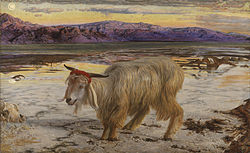Wikipedia:Picture peer review/William Holman Hunt - The Scapegoat.jpg

Somebody should nominate this at FPC I think, unless someone can point out some disqualifying flaws I failed to notice. The painting is pretty well-known and we have a good size and quality digital version of it that is already featured on Commons. I'm not doing it because I always thought that, while good, it's kind of creepy. Taker? Comment? See any flaws?
- Articles this image appears in
- Goat, William Holman Hunt, Scapegoating, The Scapegoat (painting)
- Creator
- William Holman Hunt, uploaded by Dmitry Rozhkov
- Suggested by
- I'ḏ♥One 02:45, 10 August 2010 (UTC)
- Comments
- First off the practice it's depicting is horrid torture of an animal, imho. Second, the author doesn't appear to be notable, but as far as I can tell the painting fails WP:GNG so it's page is probably a deletion candidate, imho. The two references are certainty not enough to pass WP:GNG I'm sure. The digitization of the painting seems to be sufficient, but it doesn't appear, at least to me, to be a very impressive painting. The hills in the background look far to simplistic and basic, and same with the skeleton in the foreground. Doesn't strike me as a anywhere near as detailed as some of his other works. I would have to oppose on EV grounds. — raekyT 03:03, 10 August 2010 (UTC)
- Hmm, so I'm not the only one who agrees the image is creepy, though it's mostly the colors and peculiarly located goat that freaks me out. Like it or not, scapegoating is very historical, Biblical even, and like most things Biblical its pretty irrational and a silly and horrific way to misplace responsibility for what was then considered 'sinful,' I suspect Hunt agrees since he made it such an evil-seeming illustration, but I think this is one of his best known and most notable paintings actually, it can be found on Google. --I'ḏ♥One 03:16, 10 August 2010 (UTC)
- Is there significant coverage in reliable third party sources about this specific painting? — raekyT 03:26, 10 August 2010 (UTC)
- Ok, apparently the goat is meant to represent Jesus and it was painted when Hunt was quite well-known.[1][2] --I'ḏ♥One 04:13, 13 August 2010 (UTC)
- Umm.. reference.com just uses wikipedia data, if you note it's a carbon copy and even says where it came from... The article definitely needs help. — raekyT 04:17, 13 August 2010 (UTC)
- Ok, apparently the goat is meant to represent Jesus and it was painted when Hunt was quite well-known.[1][2] --I'ḏ♥One 04:13, 13 August 2010 (UTC)
- Is there significant coverage in reliable third party sources about this specific painting? — raekyT 03:26, 10 August 2010 (UTC)
- Hmm, so I'm not the only one who agrees the image is creepy, though it's mostly the colors and peculiarly located goat that freaks me out. Like it or not, scapegoating is very historical, Biblical even, and like most things Biblical its pretty irrational and a silly and horrific way to misplace responsibility for what was then considered 'sinful,' I suspect Hunt agrees since he made it such an evil-seeming illustration, but I think this is one of his best known and most notable paintings actually, it can be found on Google. --I'ḏ♥One 03:16, 10 August 2010 (UTC)
- It's meant to be creepy. It's a picture of a goat dying of thirst, painted from life by Hunt who actually took a real goat to the Dead Sea and starved it to death. It came as a surprise to art dealer Ernst Gambart, who remarked after Hunt had presented it to him that "I wanted a nice religious picture and he painted me a great goat.". As Richard J. Lane notes, it's the "moral duty" of this picture to be "basically repulsive and unpleasant to look at", since the message of an innocent creature suffering for one's iniquities is the very message that it is intended to convey. If you find it creepy, then you are following in the footsteps of many who have gone before. If you want an FPC vote from notable art critics, here are two. First a vote from William Michael Rossetti:
| “ | With the public I fear that it will be all but a failure, and certainly a theme for no little ridicule; […] | ” |
| — W.M.Rosetti 1856, as cited in The Scapegoat (painting) | ||
And second a vote from his brother, Dante Gabriel Rossetti:
| “ | A grand thing, but not for the public | ” |
| — Dante Gabriel Rosetti. "Letter to William Allingham (1856-04)". In Oswald Doughty and John Robert Wahl (ed.). Letters of Dante Gabriel Rossetti: 1835–1860. Vol. 1. Clarendon Press. | ||
There you go. Victorian sensibilities on whether this picture should be featured to the public. Ignore those silly modern national museums choosing this as picture of the month. Ignore those modern art critics who think this to be "great art" and "intoxicating Victorian folly". What would Waldemar Januszczak know about it? Go with the Victorians! ☺ Uncle G (talk) 13:18, 13 August 2010 (UTC)
- I've got to disagree with Raeky, I think this is a fantastic painting. However, the opinions of myself and Raeky on the painting itself don't really matter- it appears, from the article on the painting, to be very notable (not quite sure what Raeky's objection is, unless I'm missing something). We have the whole picture, the dimensions are right, the colours seem right. This'd be a strong support from me, apart from the fact the colours seem to be wrong. J Milburn (talk) 13:44, 30 August 2010 (UTC)
- Seconder
